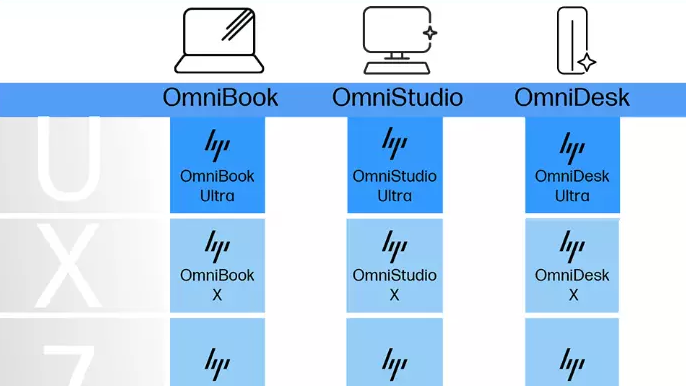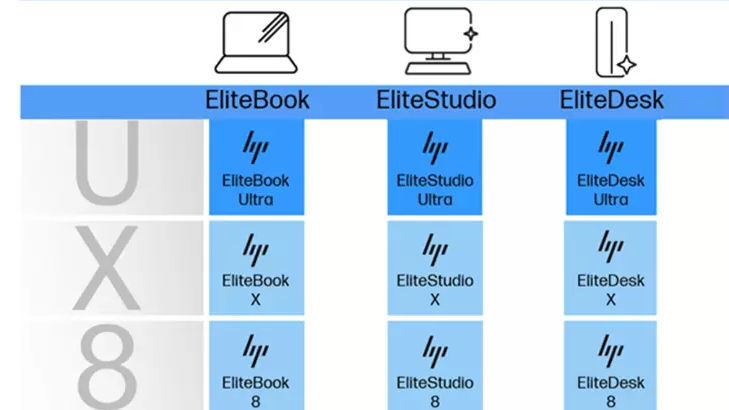HP reshuffles PC naming scheme, adds AI Helix logo branding, kills some old favorites
Omni-, Elite-, and Pro- prefixed devices are on the way.

Hoping to simplify the ever-expanding world of the PC buyers' market, HP put out a press release disclosing its new Omni-, Elite-, and Pro- prefixed naming scheme across its entire line of laptop and desktop PCs. This new naming scheme is being introduced alongside HP's own AI PC logo dubbed an "AI Helix", and an even-odd numbering scheme with even numbers denoting PCs for commercial users and odd numbers denoting PCs for consumers.
Meanwhile, the "Ultra" naming is meant to denote "the most premium offerings or devices that redefine traditional form factors". Below, we've included some more official imagery and a table breaking down all the tiers established by HP's new PC branding scheme.
All New HP PC Models
| Tiers | HP Consumer Portfolio | HP Commercial Portfolio |
| U (Ultra) | OmniBook Ultra, OmniStudio Ultra, OmniDesk Ultra | EliteBook Ultra, EliteStudio Ultra, EliteDesk Ultra |
| X | OmniBook X, OmniStudio X, OmniDesk X | EliteBook X, EliteStudio X, EliteDesk X |
| 7 (Consumer)/8 (Commercial) | OmniBook 7, OmniStudio 7, OmniDesk 7 | EliteBook 8, EliteStudio 8, EliteDesk 8 |
| 5 (Consumer)/6 (Commercial) | OmniBook 5, OmniStudio 5, OmniDesk 5 | EliteBook 6, EliteStudio 6, EliteDesk 6 |
| 3 (Consumer)/4 (Commercial) | OmniBook 3, OmniStudio 3, OmniDesk 3 | ProDesk 4, ProStudio 4, ProBook 4 |
| 2 (Commercial Only) | N/A | ProDesk 2, ProStudio 2, ProBook 2 |
Besides the new PC branding, HP is also pushing the AI PC branding with its new AI Helix logo, pictured above. According to HP, this means "they are built with unique HP AI experiences, such as HP AI Companion and Poly Camera Pro", have an NPU capable of 40+ TOPs per second, have protection against "AI-generated threats", and a "next-gen OS", which we're pretty sure just means Windows 11.
As nice as it is for HP to put in this effort to streamline its branding and clarify its offerings a little better, it's difficult to ignore some of the more flowery language presented in the original release. When explaining the shape of its AI PC logo, HP claims it is "reminiscent of the structure of DNA, symbolizing our commitment to enable the DNA of AI into our devices. Just as DNA is at the core of life's evolution, we believe AI is the driving force behind technological advancements already enhancing human potential."
While that's mostly marketing speak, it's important to remember that as it currently stands, the greatest-scale applications of AI are being seen in "generative AI" which has rightfully drawn incredible scorn from skilled artists and laborers whose livelihoods are openly being targeted. Not that AI can't be used ethically or isn't cool, of course.
Get Tom's Hardware's best news and in-depth reviews, straight to your inbox.

Christopher Harper has been a successful freelance tech writer specializing in PC hardware and gaming since 2015, and ghostwrote for various B2B clients in High School before that. Outside of work, Christopher is best known to friends and rivals as an active competitive player in various eSports (particularly fighting games and arena shooters) and a purveyor of music ranging from Jimi Hendrix to Killer Mike to the Sonic Adventure 2 soundtrack.
-
Notton Yeah, that's not going to be confusing.Reply
In fact, it seems your graph is already confused.
Unless the Elite series is supposed to go 2, 4, 5, 7? -
The table/chart which you have drawn is wrong. The Commercial products only have even numbers, and there are total 6 categories for commercial.Reply
U, X, 8, 6, 4 and 2. So instead of 7 and 5, it should be 8 and 6. Typo.
All New HP PC ModelsTiersHP Consumer PortfolioHP Commercial PortfolioU (Ultra)OmniBook Ultra, OmniStudio Ultra, OmniDesk UltraEliteBook Ultra, EliteStudio Ultra, EliteDesk UltraXOmniBook X, OmniStudio X, OmniDesk XEliteBook X, EliteStudio X, EliteDesk X7 (Consumer)/8 (Commercial)OmniBook 7, OmniStudio 7, OmniDesk 7EliteBook 7, EliteStudio 7, EliteDesk 75 (Consumer)/6 (Commercial)OmniBook 5, OmniStudio 5, OmniDesk 5EliteBook 5, EliteStudio 5, EliteDesk 53 (Consumer)/4 (Commercial)OmniBook 3, OmniStudio 3, OmniDesk 3ProDesk 4, ProStudio 4, ProBook 42 (Commercial Only)N/AProDesk 2, ProStudio 2, ProBook 2 -
So here is a more clear breakdown, since the article has not explained these points:Reply
1. HP has now killed all its older consumer and commercial PC branding, ditching Spectre, Envy, Pavilion, and Dragonfly codenames, and few more in the list.
2. When it comes to the new branding, consumer PCs are now identified as OMNI, while business laptops are labeled as ELITE.
3. HP OMEN, will however, remain HP’s gaming brand for laptops and desktop PCs. This is important for gamers.
4. The shift in naming is obviously because of the advent of AI and new Copilot+ PCs. duh ! :rolleyes:
5. And since Omni prefix applies to all consumer laptops and desktops, while the Elite prefix applies to all commercial laptops. Laptops are now either dubbed as OmniBooks (consumer) or EliteBooks (commercial).
All-in-one PCs (AIOs) are now called OmniStudio or EliteStudio, and traditional desktop PCs are OmniDesk or EliteDesk.
6. The use of OmniBook resonates with PC nerds.
Created by Hewlett-Packard in 1993, OmniBooks were originally business laptops but discontinued in 2002 when HP acquired Compaq. However, the name is more than just a callback to HP’s OmniBook heyday; it also conveys an all-powerful image for its consumer PCs, specifically, this new era of AP PCs. -
TheyCallMeContra ReplyNotton said:Yeah, that's not going to be confusing.
In fact, it seems your graph is already confused.
Unless the Elite series is supposed to go 2, 4, 5, 7?
Long evening. Fixes will be live soon. -
TheyCallMeContra ReplyMetal Messiah. said:So here is a more clear breakdown, since the article has not explained these points:
1. HP has now killed all its older consumer and commercial PC branding, ditching Spectre, Envy, Pavilion, and Dragonfly codenames, and few more in the list.
2. When it comes to the new branding, consumer PCs are now identified as OMNI, while business laptops are labeled as ELITE.
3. HP OMEN, will however, remain HP’s gaming brand for laptops and desktop PCs. This is important for gamers.
4. The shift in naming is obviously because of the advent of AI and new Copilot+ PCs. duh ! :rolleyes:
5. And since Omni prefix applies to all consumer laptops and desktops, while the Elite prefix applies to all commercial laptops. Laptops are now either dubbed as OmniBooks (consumer) or EliteBooks (commercial).
All-in-one PCs (AIOs) are now called OmniStudio or EliteStudio, and traditional desktop PCs are OmniDesk or EliteDesk.
6. The use of OmniBook resonates with PC nerds.
Created by Hewlett-Packard in 1993, OmniBooks were originally business laptops but discontinued in 2002 when HP acquired Compaq. However, the name is more than just a callback to HP’s OmniBook heyday; it also conveys an all-powerful image for its consumer PCs, specifically, this new era of AP PCs.
Also, actually— I appreciate that you're being helpful, but this is a little obnoxious. Points #1 and #5* can already be inferred based on the literal title of the story, and points #2 and #4 are explicitly addressed in the existing text. I don't appreciate the implication you're making there. *#5 also clearly outlined in the existing text.
HP Omen remaining and the trivia on OmniBook actually is relevant and an appreciated addition, but everything else you just mentioned is either already present or so obvious it doesn't truly doesn't need restating. I would prefer that any backseating from the comments section be limited to tidbits I Missed or Actual Mistakes. -
For you it might be obvious or present/clear in the article , but sorry, it's NOT. At least not for me ! I was just giving a constructive and a more clear breakdown !Reply
That's all. It's up to you how to take it. Didn't mean any insult to the original article's write-up or contents whatsoever. Misunderstood me here. I'm not that type of guy.
As an author, you should act maturely, instead of getting hyper for no obvious reason. Also, nowhere your article has mentioned the Spectre, Envy, Pavilion, and Dragonfly codenames, including Elite prefix applies to all commercial laptops.
Laptops are now either dubbed as OmniBooks (consumer) or EliteBooks (commercial). All-in-one PCs (AIOs) are now called OmniStudio or EliteStudio, and traditional desktop PCs are OmniDesk or EliteDesk. Of course nobody asked for it, but like mentioned earlier, I was adding some more context to it.
BTW, how about correcting your previous article first, instead of bashing us for commenting here ?
https://forums.tomshardware.com/threads/thermal-grizzlys-new-heatspreader-claimed-to-lower-cpu-temperatures-by-nearly-15-degrees-celsius.3845119/ -
TheyCallMeContra ReplyMetal Messiah. said:For you it might be obvious or present/clear in the article , but sorry, it's NOT. At least not for me ! I was just giving a constructive and a more clear breakdown !
That's all. It's up to you how to take it. Didn't mean any insult to the original article's write-up or contents whatsoever. Misunderstood me here. I'm not that type of guy.
As an author, you should act maturely, instead of getting hyper for no obvious reason. Also, nowhere your article has mentioned the Spectre, Envy, Pavilion, and Dragonfly codenames, including Elite prefix applies to all commercial laptops.
Laptops are now either dubbed as OmniBooks (consumer) or EliteBooks (commercial). All-in-one PCs (AIOs) are now called OmniStudio or EliteStudio, and traditional desktop PCs are OmniDesk or EliteDesk.
I'm a human being before I'm an author, and as a human being I am very comfortable telling someone who isn't paying me when they're being "a little obnoxious", or particularly entitled. In fact I'm comfortable telling people who Do pay me when they're doing that.
I didn't care to list all of the brands that are dead because, again, the whole crux of the story is that This is HP's new product stack. You are listing names that no longer have relevance to people trying to identify a modern PC from HP. I wouldn't disagree with someone else's coverage choosing to list those, but this is My Coverage, so I'm gonna do it how myself and my editors see fit. Deal with it.
BTW, how about correcting your previous article first, instead of bashing us for commenting here ?
Please stop being melodramatic. You're not getting bashed right now. That said, I do care about fixing legitimate mistakes, and I hadn't checked that thread yet— I'll get to it when I can, likely in a less busy time of the day. I Am sorry for those Actual Mistakes in That Article, but I'm not gonna pull out my hair over valid writing choices in This One. Sorry.

